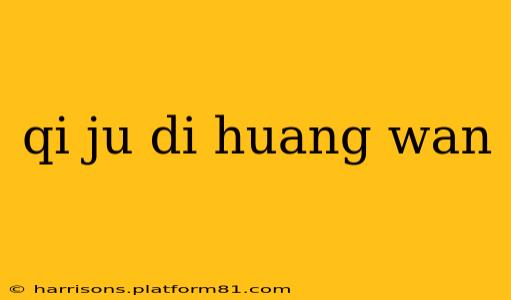Qi Ju Di Huang Wan (杞菊地黄丸), often translated as Lycium-Chrysanthemum-Rehmannia Pill, is a classic formula in Traditional Chinese Medicine (TCM) renowned for its ability to nourish the liver and kidneys, and improve eyesight. This comprehensive guide will explore its uses, benefits, ingredients, potential side effects, and considerations before using it.
What is Qi Ju Di Huang Wan Used For?
Qi Ju Di Huang Wan is primarily used to address conditions associated with liver and kidney yin deficiency. This deficiency manifests in various symptoms, including:
- Blurred vision and dry eyes: The formula's nourishing properties help improve eyesight and alleviate dryness.
- Dizziness and tinnitus: These symptoms often stem from liver and kidney imbalances.
- Headaches and migraines: Qi Ju Di Huang Wan can help alleviate certain types of headaches linked to yin deficiency.
- Premature graying of hair: This is another common sign of liver and kidney deficiency.
- Fatigue and weakness: Yin deficiency can lead to general feelings of tiredness and low energy.
It's crucial to remember that Qi Ju Di Huang Wan is not a cure-all and may not be suitable for everyone. Its effectiveness depends on the individual's specific condition and constitution.
What are the Ingredients of Qi Ju Di Huang Wan?
The formula's effectiveness stems from the synergistic action of its key ingredients:
- Shu Di Huang (熟地黄) – Prepared Rehmannia Root: A primary tonic for the kidneys, nourishing yin and blood.
- Shan Zhu Yu (山茱萸) – Cornus Fruit: Another powerful kidney tonic, strengthening the essence and supporting the kidneys' yang energy.
- Shan Yao (山药) – Chinese Yam: Nourishes the spleen and kidneys, supporting the body's overall energy levels.
- Gou Qi Zi (枸杞子) – Goji Berry: Nourishes the liver and kidneys, improving eyesight and vitality.
- Mu Dan Pi (牡丹皮) – Peony Bark: Clears heat and promotes blood circulation, helping to alleviate stagnation.
- Ze Xie (泽泻) – Alisma Rhizome: Drains dampness and reduces swelling, promoting balance in the body’s fluids.
- Fu Ling (茯苓) – Poria Cocos Sclerotium: Drains dampness and calms the mind, promoting mental clarity.
- Ju Hua (菊花) – Chrysanthemum Flower: Clears liver heat and improves eyesight, particularly beneficial for blurred vision.
The precise ratios of these ingredients can vary slightly depending on the manufacturer.
Who Should Not Take Qi Ju Di Huang Wan?
While generally considered safe, Qi Ju Di Huang Wan is not suitable for everyone. Individuals with the following conditions should avoid this formula:
- Those with external wind-cold: The formula's warming properties may exacerbate cold symptoms.
- Those with excess dampness: This formula can worsen existing dampness conditions.
- Those with edema due to heart failure: The formula might not be appropriate in this situation.
- Pregnant or breastfeeding women: It's always best to consult a healthcare professional before taking herbal supplements during pregnancy or breastfeeding.
Can Qi Ju Di Huang Wan Improve Eyesight?
Qi Ju Di Huang Wan is often touted for its potential to improve eyesight, particularly in cases of dry eyes or blurred vision associated with liver and kidney yin deficiency. The ingredients, such as Goji Berry and Chrysanthemum Flower, are known for their beneficial effects on eye health. However, it's crucial to understand that this formula is not a replacement for medical treatment for serious eye conditions. If you experience vision problems, consult an ophthalmologist for a proper diagnosis and treatment plan. Qi Ju Di Huang Wan may be considered as a supportive measure, not a primary treatment.
What are the Potential Side Effects of Qi Ju Di Huang Wan?
Generally, Qi Ju Di Huang Wan is well-tolerated. However, some individuals may experience mild side effects such as digestive discomfort or allergic reactions. If you experience any adverse reactions, discontinue use and consult a healthcare professional.
Is Qi Ju Di Huang Wan Right for Me?
This question can only be answered by consulting a licensed practitioner of Traditional Chinese Medicine (TCM). A TCM practitioner will assess your individual constitution, symptoms, and medical history to determine if Qi Ju Di Huang Wan is an appropriate treatment option for you. Self-treating can be risky, so professional guidance is highly recommended.
Disclaimer: This information is for educational purposes only and is not intended as medical advice. Always consult with a qualified healthcare professional before starting any new supplement or treatment, particularly if you have pre-existing health conditions or are taking other medications.
